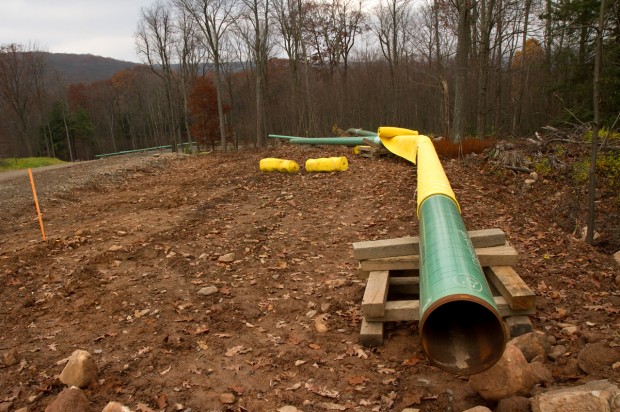Advocates urge last-minute vote to save PA pipeline safety law
-
Jon Hurdle

Lindsay Lazarski / WHYY
A bill in the Pennsylvania legislature would require construction companies to call before digging near natural gas gathering lines like this one in Loyalsock State Forest.
An effort to preserve and expand a Pennsylvania law designed to protect underground pipes and cables from accidental damage by construction work has almost run out of time in Harrisburg.
A state bill to amend the Underground Utility Line Protection Act was on Wednesday, still due for consideration by a Pennsylvania House committee, this just six days before the end of the current legislative session and less than three months before the current law expires on Dec. 31.
The bill, SB 1235, which passed the Senate in late September, would enhance the current law that requires construction companies, municipalities and others to call the PA One Call service, or 811, before they begin digging, to determine if their work would risk hitting underground pipes or wires.
The bill would end exemptions for so-called Class 1 gathering lines that connect natural gas wells with major pipelines in rural areas; require operators of pipes and wires to map abandoned lines, and transfer enforcement powers from the Department of Labor to the Public Utility Commission.
Supporters of the law say there are more than 6,000 “hits” on underground infrastructure across the state every year, about half of which involve natural gas lines, jeopardizing public safety; threatening service disruptions, and endangering workers.
The Department of Environmental Protection estimates that 10,000 miles of gathering lines will be built in the Class 1 category over the next decade as the gas industry builds out its capacity to pump natural gas to market from the Marcellus Shale.
In July 2015, a backhoe hit an unmarked natural gas line in Armstrong County, causing an explosion that led to the operator’s death early this year.
Further such tragedies could be prevented if the current bill becomes law but would be more likely to occur if the existing law is allowed to “sunset” at the end of the year, the bill’s supporters say.
“By every measure, One Call has worked as intended,” said state Sen. Lisa Baker, a Republican from the 20th District, covering six counties in northern and northeastern Pennsylvania. “It is a sensible approach to public safety, neither high-cost nor high on intrusive mandates.”
“But we have an opportunity to extend its reach,” Baker said. “The purpose of this bill is to reduce the number of problems encountered.”
In mid-October, the bill was due for consideration by the House Consumer Affairs Committee. If approved by that panel, it is due to go before the full House.
Another bill, SB 2308, sponsored by Republican Rep. Robert Godshall of Montgomery County, would extend the current law by one year in order to give lawmakers more time to consider longer-term options.
But the PUC, which strongly backs Sen. Baker’s bill, rejected the proposed temporary extension, saying it would not address safety issues.
“Our concern entirely focuses on safety,” said PUC spokesman Nils Hagen-Frederiksen, citing the Armstrong County explosion, the kind of incident that he said could have been prevented if the current law did not exempt reporting for Class 1 gathering lines in rural areas.
He said underground lines are struck on average every 20 minutes, posing a danger to workers, utility crews, emergency responders and nearby residents, as well as risking service interruptions, environmental damage and costly repairs.
Hagen-Frederiksen criticized an effort by the Pennsylvania Independent Oil and Gas Association (PIOGA), a trade group, to preserve the exemption for Class 1 gathering lines, saying they are not low-pressure lines, and that the Armstrong County explosion shows why the exemption needs to be removed.
He noted that exemptions are also opposed by the federal Pipeline and Hazardous Materials Safety Administration (PHMSA), and said federal safety funding may be at risk if the exemptions are not removed.
But Kevin Moody, general counsel for PIOGA, said the exemption should remain for Class 1 gathering lines because they are not regulated by either the federal or state governments. He said operators of those lines should not have to pay the cost of the notifications made by those who plan to excavate near the lines.
Moody accused the PUC of falsely telling legislators that Pennsylvania could lose federal safety funding if it does not remove the exemption for Class 1 gathering lines.
“They keep providing PHMSA documents that don’t support what they are saying but they keep saying it anyway,” Moody said in an interview, referring to the PUC.
Bill Kiger, chief executive of PA One Call, said that allowing the current law to expire without being amended by SB 1235 would expose workers and communities to the kind of risk shown by the Armstrong County incident.
In Harrisburg, Andrew Seder, a spokesman for Sen. Baker, urged lawmakers to vote for the bill before the expiration of the current law.
“If you don’t have this law in place, you would have utilities, you would have townships, you would have gas line entities being able to go out and drill or dig without knowing what they are going to hit,” Seder said. “There would be no requirement on their part to make that important safety call.”
















